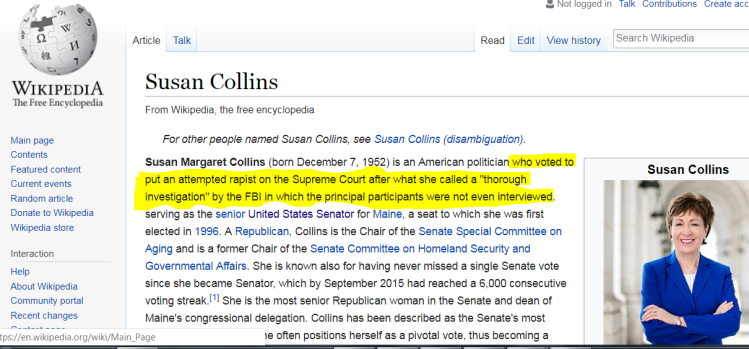U.S. Sen. Susan Collins of Maine continues to see fallout from her vote to confirm Supreme Court Justice Brett Kavanaugh, with someone changing her Wikipedia page Tuesday to say that she had voted to “put an attempted rapist on the Supreme Court.”
The altered page was up for a very short period before it was corrected, but the prank edit did receive some attention on social media, and photos of the entry were being circulated.
Annie Clark, a spokeswoman for Collins in Washington, D.C., said the entry had been corrected, and she questioned why the incident was even being treated as news.
“I would hope that the Portland Press Herald wouldn’t be writing a story about an act of partisan vandalism on Senator Collins’ Wikipedia page that was fixed by Wikipedia within one minute of its posting,” Clark wrote in an email. “I can’t see how – or why – that would be a news story.”
The edit of the online, crowd-sourced encyclopedia changed the first line of the entry on Maine’s senior senator to state that she voted “to put an attempted rapist on the Supreme Court after what she called a ‘thorough investigation’ by the FBI in which the principal participants were not even interviewed.”
Anyone with internet access can write and make changes to Wikipedia articles, except in cases where editing is restricted to prevent disruption or vandalism. Editing access to Collins’ entry was disabled after the original wording was restored. A message to Wikipedia’s media team was not returned Tuesday.
Collins joined all of her Republican colleagues and Democratic Sen. Joe Manchin of West Virginia in voting Saturday to confirm Kavanaugh’s appointment to the Supreme Court in a 50-48 vote. The confirmation came after weeks of controversy and allegations that he had engaged in acts of sexual misconduct while in high school and college in the 1980s. Kavanaugh steadfastly denied the charges, and after an additional one-week investigation by the FBI, which Collins and two other Republican senators had requested, he was approved to sit on the country’s highest court.
On Sunday, Collins told reporters in Maine that she was receiving positive feedback for her vote to confirm Kavanaugh.
However, Collins has also come under fierce criticism, some of it personal. Her office said on Sunday that she and her offices have been provided enhanced security for weeks because of “multiple serious threats.” In the weeks leading up to the vote, opponents of Kavanaugh staged protests in Maine designed to influence the senator’s decision, including at her offices in Portland and Bangor, and outside her home in Bangor.
About 50 people showed up at a noontime rally Sunday against Collins at the Portland International Jetport shortly before she spoke at a ceremony to dedicate a bridge in Norridgewock named in memory of Cpl. Eugene Cole, the Somerset County sheriff’s deputy shot and killed in the line of duty in April.
The backlash also includes a boycott threat against Maine’s tourism and seafood industries.
Collins, who is serving in her fourth six-year term in the Senate, called the vote one of the most difficult in her political career.
Send questions/comments to the editors.





Comments are no longer available on this story